This post is part of our special coverage 2011 on Global Voices.
2011 was an eventful year for social media as people used many tools to organize protests, share frequent updates and news which had impacted our lives. We have seen people talking intensely in Facebook, Twitter, blogs etc about deaths of world-changing figures – from inventors to dictators and terrorists. The Arab Spring and Occupy Wall Street protests became viral and the world was glued to the events in the Middle East and elsewhere in the world.
South Asian countries also have seen use of social media to discuss about many controversies and protests. This year we saw more netizens using microblogging sites to share their opinions.
Controversies
In January, Pakistani celebrity Veena Malik was accused by religious hardliners of immoral behavior as she took part in the Indian reality show Big Boss. Pakistani netizens stood divided amongst its conservative and liberal lines.
At the end of the year Veena Malik stirred up another controversy when FHM India, a male lifestyle magazine, published her nude picture on its cover page. Veena’s shoot with an ISI Tattoo on her arm sparked strong reactions from right, left and center in Pakistan and India.
On the other hand a Pakistani Islamic televangelist was also at the center-point of a controversy. A behind-the-scenes video depicted Dr. Amir Liaquat Hussain, a notable religious scholar, uttering abuse and profanities as well as religious blasphemy.
In April the Sri Lankan government had condemned a 196 page leaked report on civilian casualties by an United Nations (UN) advisory panel, dismissing it as flawed and biased. Intense debate ensued in Twitter and Facebook.
In May the accidental death of a research scholar from Kerala, India sparked controversies about the privacy of women, privacy of a dead person and in general about the lingering male chauvinism in Keralan society.
A couple of Indian Ministers were drawn into controversy because of their statements. India's Health Minister, Ghulam Nabi Azad, angered the gay community and gay rights activists with his comments at a HIV/AIDS conference in New Delhi. Netizens condemned his take on homosexuality as “unnatural” and a “disease” that had come from the West.
In December the Indian Union Communications and IT Minister Kapil Sibal asked Internet giants such as Facebook, Google and Yahoo to pre-screen derogatory, defamatory and inflammatory content about political leaders and religion and filter if objectionable. His words got a huge backlash from the netizens.
In November, the Pakistan Telecommunication Authority (PTA) become the center of controversy when it sent a list of 586 Urdu and 1,109 English banned words and phrases to the mobile phone operators in the country to filter them.
The pregnant Bollywood actress Aishwarya Rai Bachchan and her impending child birth produced a media hype in India. Bangladeshi exile writer Taslima Nasrin was also drawn into controversy when she tweeted that she wished that Aishwarya would give birth to a girl child.
Actions have been taken by a Bangladeshi court against a teacher living abroad, as a consequence of his Facebook status.
Protests
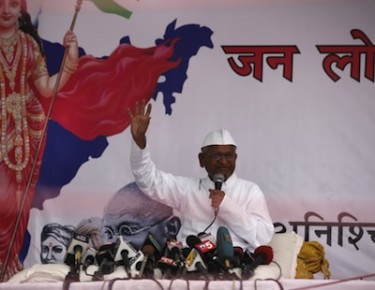
Anna Hazare addressing the people and media at Jantar Mantar, Delhi. Image by Sarika Gulati, copyright Demotix (08/04/2011).
In India, social media has been extensively used to power civil society's push for a proposed anti-corruption bill. The movement is being led from the front by a Gandhian social activist Anna Hazare, who continues to receive a huge amount of support in home and abroad – online and offline.
In November, India's Agriculture Minister, Mr. Sharad Pawar, was slapped on the face by a youth, who was apparently fed up of the growing inflation, corruption and graft cases in the country and decided to hit out at the Union Minister in protest. Netizens discussed the merits and demerits of this violent protest.
In Bangladesh, citizen media was a vital tool for the indigenous people in the Chittagong Hill Tracts of Bangladesh who shared news about the ethnic clashes between Bengali settlers and indigenous people. These minorities have found a voice via blogs and Facebook when the mainstream media have been accused of ignoring the plights of the local aboriginal people. Later in the year many Bangladeshi indigenous people had taken the streets holding meetings, human chains and rallies, demanding constitutional recognition of their identity. Bloggers engaged in a debate on this issue.
In this region some of the protests were unprecedented and unique. In several South Asian countries Dowry is prohibited by law but is still widely and illegally practiced. A protest against dowry was much discusses and lauded in the social networks in Bangladesh. Farzana Yasmin sent ripples across the country by divorcing the bridegroom right after the wedding as her in-laws demanded a TV set, refrigerator, motorbike and a few more things as ‘gifts’ from the bride's family in presence of the guests.
In Bangladesh capital Dhaka after a three-fold campaign via Blogs, Facebook and street protests authorities of the Viqarunnisa Noon School and College (VNC) were forced to sack and arrest a teacher accused of sexually molesting a student.
In July bloggers and online activists among other protesters were arrested while striking in protest of a recent Production Sharing Contract (PSC) between the Bangladesh government and United States energy giant ConocoPhillips for deep sea gas exploration.
This year in October Eight Bangladeshi migrant workers were beheaded in public in Saudi Arabia for being involved in the robbing a warehouse and killing of a security guard. Netizens were enraged by this horrific punishment and questioned the transparency of the trial.
The Occupy Wall street movement prompted a similar protest in Dhaka where people vowed to get themselves free from the two feuding, corrupt and occupier political alliances.
A recent venture by the Bangladesh government to takeover 25000acres of wetlands (Arial Beel) 60km South of the capital city of Dhaka, for a proposed International airport and satellite city led to protests and violence in the area. Netizens too, reacted strongly to the government debating the need for a new airport and the government was forced to back down on the airport project.
In Pakistan, the death of 24 Pakistani troops by friendly fire from NATO helicopters and fighter aircrafts in Pakistan sparked protests across the country.
Raymond Davis, an American diplomatic staff, is under investigation for the double murder of two Pakistani motorcyclists in Karachi, Pakistan. Following the US demand to release Davis, the protesters took to the streets in a country which already has increasing anti-US sentiments.
In Sri Lanka, clashes at the Katunayake Free Trade Zone (FTZ) in Sri Lanka between protesting workers and police claimed the life of an young worker and injured many workers and policemen. The debate on the social media on this issue sent a strong signal to the Sri Lankan government.
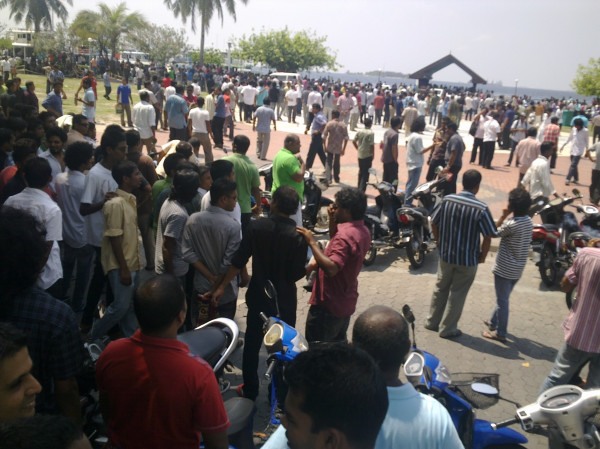
Protesting increase of commodity prices in Maldives. Image from Twitpic by Ahmed Nazim (@GraveBone).
For seven consecutive days, thousands of residents of Male, the capital of Maldives, have protested on busy streets and public spaces, expressing their dissatisfaction over soaring prices of consumer goods and economic mismanagement of the government. Madivian citizen journalists shared the updates of the protests.
Nepali Internet users were caught in disarray as the Internet Service Provider’s Association of Nepal (ISPAN) shut down its internet service as a mark of protest against the government's crackdown on ‘illegal VOIP call bypass’.
The South Asia authors team will continue to highlight and translate more citizen voices from across the region in 2012. You can get involved in the Global Voices community in multiple ways. Please do send us your suggestions and feedback. Wishing you a happy 2012.
This post is part of our special coverage 2011 on Global Voices.


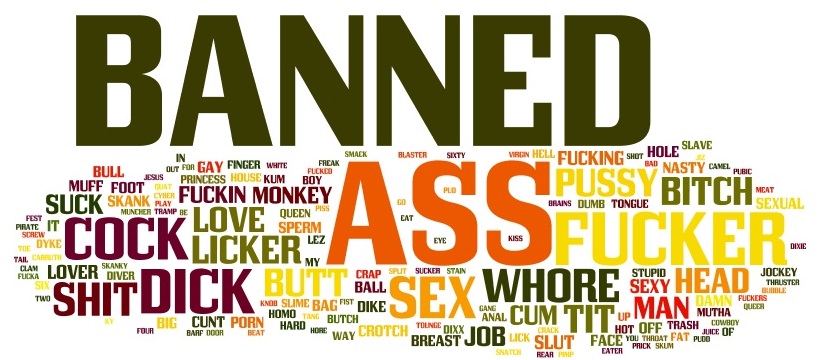
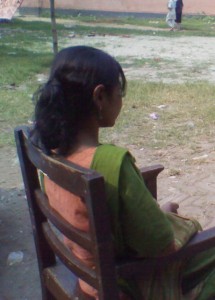
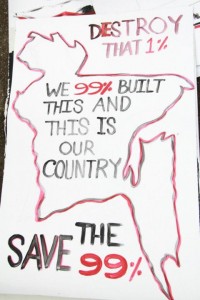






1 comment
internet is here 2 stay n if Indian courts ban Google n Facebook a 1000 new sites will spring up. India will have 2 b firewalled